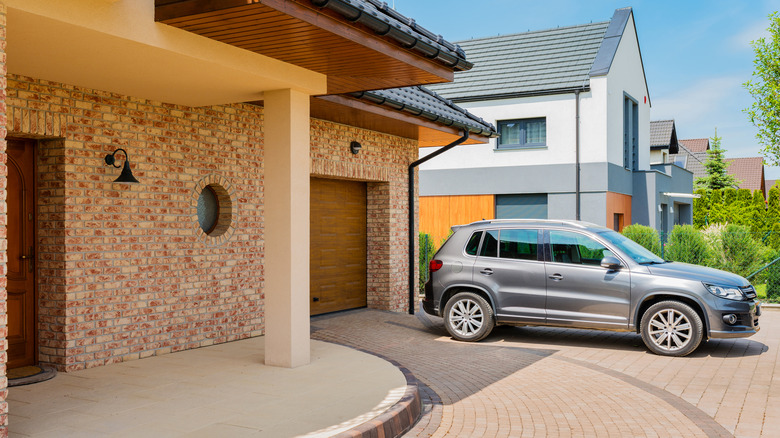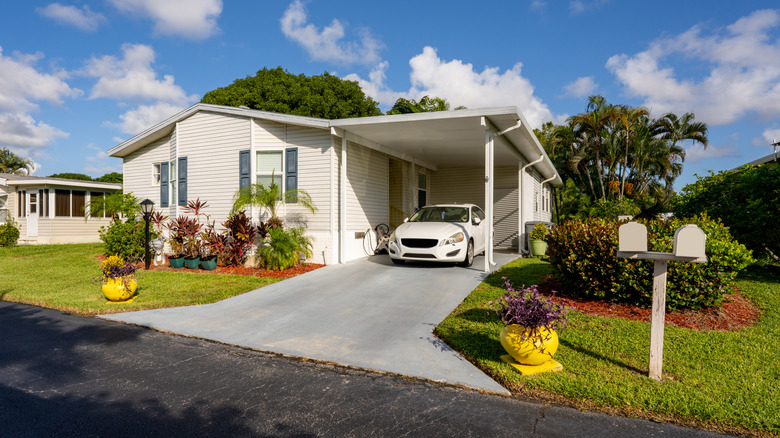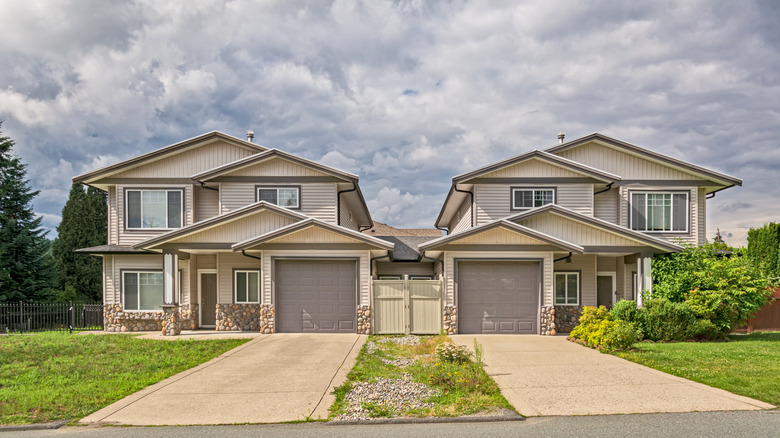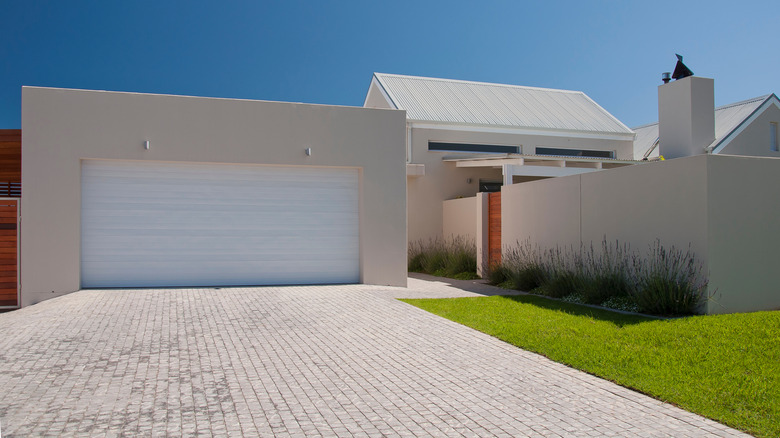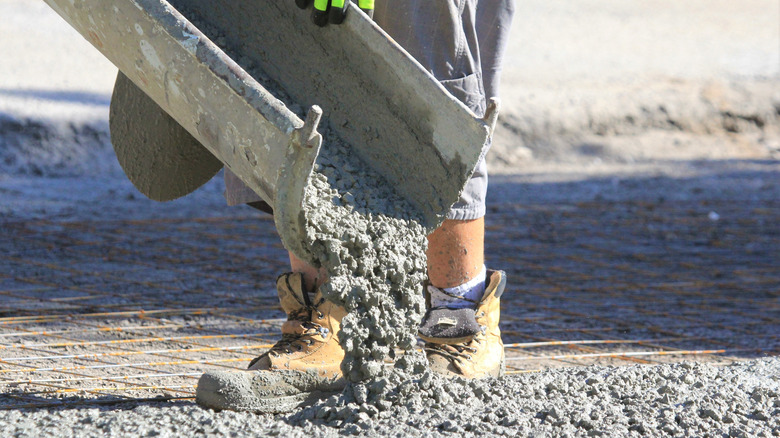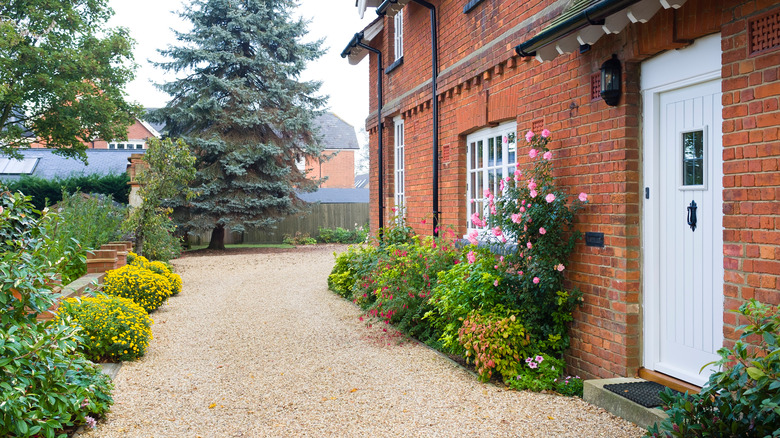How Much Does It Cost To Upgrade Your Driveway
The driveway is one of the first things that people see when they arrive at a home. Upgrading the driveway is therefore a fantastic opportunity for a homeowner to increase the curb appeal of their property while installing a new and functional element that will last for many years. Forbes Advisor estimates that a typical concrete driveway will retain its form and functionality for as many as 75 years, meaning that a single refurbishment can last you a lifetime.
Driveway construction won't break the bank either. The average price per square foot rests between $3 and $12, per Forbes Advisor, with labor costs coming in at around the same figure. All this adds up to a range of $2,350 to $7,500 for a standard concrete driveway with alternative materials coming in at varying but similar pricing structures. The most expensive option on average is the paver construction. But this type of driveway also provides a unique structural feature that adds significant visual aesthetic appeal to the home, making it something worth thinking about if your financial situation allows for the splurge.
In addition to the material options available, it's important to think through the shape of your new or improved installation. Changing the design of a standard driveway to incorporate a curve, or even an S-shaped double bend, will increase the cost by an estimated 10% to 30%, yet it will also transform the visual aspect of the feature (via HomeAdvisor).
Factors for cost
Materials and labor are the primary cost factors when approaching the remodel or initial installment of a driveway. Per Forbes Advisor, each of these factors will account for around half your total budget
Material costs
Materials can range across a broad spectrum depending on the type of driveway you choose to install. For instance, a concrete driveway will need iron rebar to add structure to the installation. As well, a concrete pour will make use of mixing equipment, flattening slides, and other materials that are integral to the build (via The Balance Small Business).
When hiring a contractor to complete the job, they will quote you for the materials and labor as a complete bill. It's often a good idea to source a few quotes as you approach the installation of a new driveway because different service providers may price the materials needed for the job in their own ways—either inflating or reducing the cost as a result.
Of course, getting your hands on high quality construction materials is essential to building a long lasting driveway, regardless of the type of installation you ultimately choose. Civiconcepts reports that a number of flaws in concrete mixtures, for instance, can lead to an improper pour and cure which will ultimately require digging out and a fresh pour to remedy. Working with a contractor who has lots of experience and is happy to provide references is a great way to assuage any concerns you might have over the potential for faulty equipment or workmanship.
Labor costs
Driveways are significant construction projects, and as a result should typically be tackled by a professional rather than as a DIY improvement. Concrete, paver, and asphalt driveways alike (as well as any other construction option) all take considerable skill and expertise to lay down with precision and speed. Indeed, speed is a hidden requirement when installing a new driveway. This is because any material you use to create the addition will need time to set or cure into a hardened and usable state. But the elements don't wait for the plans of homeowners or contractors. Planning out a pour or build to correspond with a forecasted dry period is an essential part of the success of any driveway construction. Forbes Advisor suggests that most homeowners may find that the summer months offer the best time to install a new driveway, but this can vary widely across circumstances persisting in both statewide and local areas.
This need for a speedy installation makes for an additional reason to hire a professional to complete the job. For a homeowner who has never operated a concrete mixer, the endeavor can easily spill over the allotted timeline, placing the entire pour at risk because of imminent rain or other weather conditions that don't provide optimal curing or setting.
Additional costs
In addition to the two main factors that influence the cost of building a new driveway, there are some other considerations to be made when laying down this feature.
When permits are needed
Permits won't cost much in the grand scheme of the installation; however, this is an important step in crafting a driveway that meets the standards of your local community guidelines. HomeAdvisor reports that a typical driveway permit will cost between $50 and $200, but this fee will sometimes be waived by your local authority depending on certain factors and homeowner rights of access. The importance of permitting isn't just a question of permission though. In order to pour a new concrete slab or add other impermeable features to the ground, many communities require environmental surveys to ensure that water drainage remains at acceptable levels to prevent toxins from leaching into the soil and potentially reaching groundwaters in the area.
Demolition and removal
For a driveway renovation, you'll need to eliminate the existing surface before you can pour or build a new one. Demolition is a serious job and this can add to the overall expense. HomeAdvisor reports that demolishing a concrete driveway can range anywhere from $250 up to about $3,000. HomeAdvisor also notes that demolition services will always include the removal of resulting debris, as well as grading the new surface to accommodate the installation that will take its place.
Perimeter landscaping
As a byproduct of the demolition and other upheaval likely to occur in a front yard during the construction of a new driveway, many homeowners choose to add landscaping tasks to the project for a complete makeover in one fell swoop. Angi estimates that a typical landscaping job will cost around $3,370, with an average range between $1,300 and $5,600.
Types of driveways
Homeowners have a range of options when it comes to selecting driveway construction materials. Each type provides its own catalog of benefits, so taking time to consider the driveway material that's best for your home and geographic location is a must.
Concrete
Often the most common sight in residential driveway construction, a concrete pad is an easy installation that still offers a few key customization options for homeowners looking to add a unique flair to their exterior space. HomeAdvisor notes that a typical concrete driveway pour will cost between $8 and $18 per square foot, with stamping and staining as added features that add character to the curing concrete. Well taken care of concrete driveways will last for decades, making them a favorite in all corners of the United States.
Asphalt
Many homeowners select an asphalt finish for their driveway. Asphalt won't last as long as the standard concrete pour (instead retaining its structural integrity for 15 to 20 years, according to HomeAdvisor), however it will better handle the extreme temperature swings that are found across certain areas of the United States. Both high heat and freezing temperatures will play a much smaller role in the ongoing physical stability of an asphalt driveway than one constructed with concrete and rebar. This makes asphalt a great option for any homeowner in an area that sees both high heat summers and freezing temperatures in the winter. Places like Boston, Detroit, and New York City all experience this wide swing and homeowners in these locales may benefit greatly from this addition.
Gravel
A gravel driveway costs an average of $1,500, according to HomeAdvisor, and is the least expensive option for a constructed driveway (excluding a bare soil or grass parking surface). Gravel is a versatile surface option and a popular choice in rural communities. Gravel requires periodic top ups to maintain structure, but specialized maintenance to prevent cracking, sagging, or sinking won't be necessary. With simple, standard maintenance practices a gravel driveway can last for a century!
Pavers
American Paving Design reports that pavers, bricks, and cobblestones are high-end options that can soar to as high as $50,000 for installation (depending on the total area being covered and the complexity, thickness, and fabrication method of the bricks themselves).
Bricks and pavers are a great addition to the front of any home and can be laid in intricate patterns that really capture the essence of your family's spirit. These driveways are some of the best-looking, and can last more than 50 years if proper care and maintenance is conducted on the element. Pavers can be laid in virtually any configuration, and when used in tandem with under-surface heating elements, this type of driveway can make for a luxurious home environment that is always welcoming.
Heated driveways
A heated surface is a unique luxury that can pay you back in time and energy over the years. HomeAdvisor reports that heating elements can be placed underneath concrete, asphalt, chip seal, and paver surfaces, making them a versatile addition to many driveway projects. Heated driveways help reduce the effects of snow buildup and offer a safer walking surface throughout the year. With this feature incorporated into your exterior surface, you won't have to worry about slipping on ice formations when walking down to the mailbox or getting into your car in the morning. Likewise, shoveling away the snow that has piled up behind your car becomes a non-issue, as the heating coils melt it away before you've even had a chance to think about the caution or added work that goes into typical winter morning preparations.
Why you need to upgrade your driveway
Adding a new driveway is a practical way to improve your life as a homeowner. Driveways make for a streamlined experience as you enter and leave the home, and the added safety that your driveway provides as a shelter from the primary roadway will give you peace of mind.
A safer place to park
A driveway offers homeowners a much safer alternative than the on-street parking that may be the norm for some. Parking on the street provides easy access to the roadway, of course, but it also makes your car vulnerable to potentially unsafe drivers or others that aren't paying attention. It only takes a moment of lost concentration to cause an accident which could damage your parked car on the side of the road. These accidents, sometimes notated as 'looked but failed to see' (via Ergonomics), often involve cars parked directly in line with the flow of traffic.
An accidental collision that can severely impact your mobility and financial stability. Parking on a driveway keeps you a safe distance from that flow of traffic and also removes the damage risk to your car.
Driveway replacement can be cheaper than continuous repairs
Premier Surfacing reports that taking the plunge on a new driveway is actually cheaper than continuous repairs after your surface has begun to see extensive cracking or chipping. Once this begins to take place, routine maintenance will be required. Instead of calling out a local driveway repair pro every few months to patch up your surface and keep it functioning properly, tearing out the old driveway and adding a new structure can provide a cost benefit over the long term. In addition, Premier Surfacing notes that a driveway that's installed correctly and makes use of quality materials can increase the fiscal value of your home by 5% to 10%, adding more than just the elimination of maintenance expenses.
Benefits of a new driveway installation
The benefits of a new driveway are direct and noticeable. Not only will you enjoy many years of a durable surface that can support parked cars, outdoor activities, and everything in between, replacing your driveway will also enhance the visual and fiscal aspects of your home.
A modernized aesthetic for your home's exterior
Installing a new driveway is a fantastic way to increase your home's curb appeal. Adding this feature will beautify the home in a unique way. Bestco Surfacing reports that many homeowners focus intensely on modernizations and updates to the style and visual aspects of their home's interior but fail to take advantage of exterior areas that can make a massive difference as well. Renovating the driveway renews the approach to the home's front door. It's a great way to make a striking statement about the home itself.
Driveways make life easier for urban area homeowners
Homeowners who call larger city settings home often must contend with competitive street parking rather than enjoying a dedicated space or two reserved just for their cars. With the addition of this sheltered space that brings your vehicle in off the roadway, a transformation in the ease of routine tasks can begin to take place. Homeowners who live with the benefit of a driveway are blissfully ignorant of the trouble that street parkers deal with on a daily basis (via Bestco Surfacing). The question of driving or walking to the grocery store for a few necessities, for instance, isn't one that homeowners with a driveway ever have to think about. The simplicity of life that comes with a driveway is an immensely valuable thing for those who have never experienced it. Making this change will revolutionize the way you think about every chore, event, and task.
